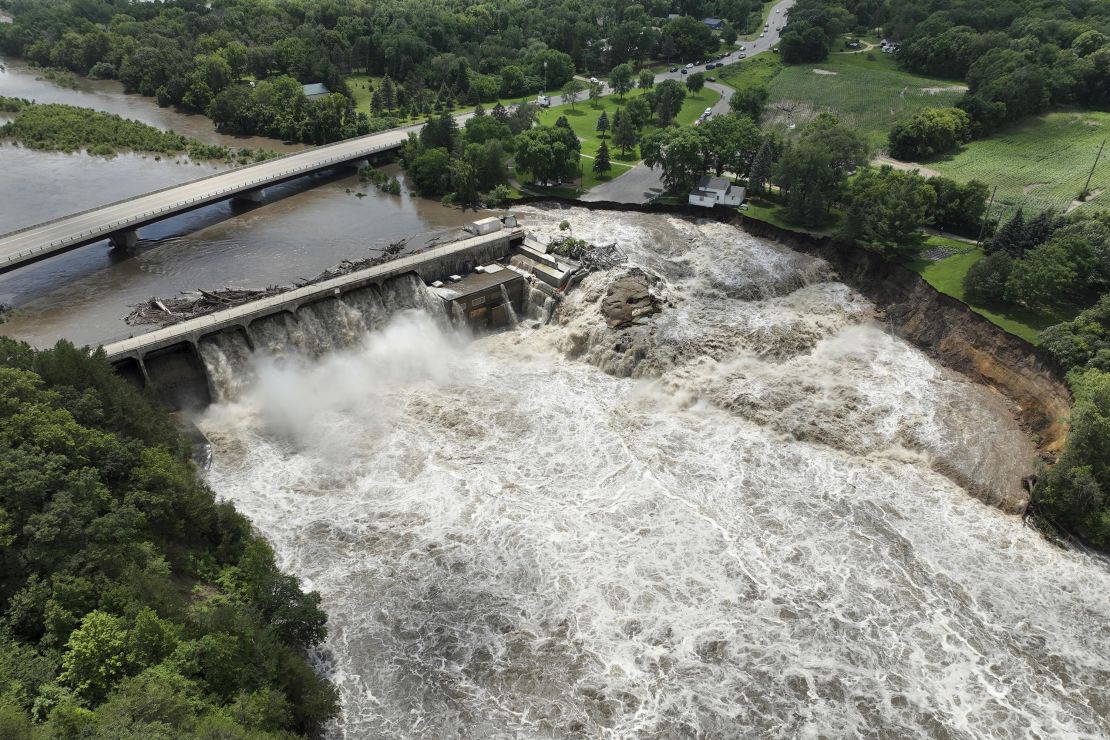At least two people are dead after severe storms and major flooding hit the Midwest, according to officials, and a dam in southern Minnesota built in the early 1900s is at risk of failing.
Rapidan Dam near Mankato was in “imminent failure condition,” The Blue Earth County government announced in a Monday Facebook post.
“We do not know if it will totally fail or if it will remain in place, however, we determined it was necessary to issue this notification to advise downstream residents and the correct regulatory agencies and other local agencies,” the county said.
The dam – which has been in a “state of disrepair,” according to a 2021 study – was still standing Tuesday afternoon, and the county said there are no current plans for mass evacuations.
During a news conference, Gov. Tim Walz cautioned: “We are not out of the woods yet.”
Some communities have not reached peak water levels, he said.
The water flow rate peaked Monday and has slightly decreased Tuesday, according to a news release from Blue Earth County emergency management officials. Authorities are continuing to monitor the dam.
The flooding in Blue Earth County is threatening the family home of resident Jenny Barnes and their nearby business The Dam Store, CNN affiliate KARE reported.
“It’ll happen. We don’t know when but it’s going to be inevitable that the house is going to go,” Barnes told KARE.
The Dam Store, known for its homemade pies, has been in business since 1910 and owned by Barnes’ family since 1972.
“That’s our life, as well. That’s our business; that’s our livelihood. It’s everything to us,” Barnes told KARE. “There’s no stopping it. It’s going to go where it wants to go. It’s going to take what it wants to take. And everybody pray that it doesn’t take The Dam Store.”
During the Tuesday news conference, Minnesota Department of Agriculture Commissioner Thom Petersen highlighted the concerns for farmers. While crops don’t look damaged from a road perspective, Petersen said, the aerials show “the widespread difficulties our farmers face.”

Walz said the town of Waterville, in nearby Le Sueur County, also saw a “certainly dramatic” impact from the flooding, with dozens of homes flooded up to the second floor.
More than 40 National Guard soldiers were deployed to Waterville pump stations to ensure they operate around the clock, protecting critical infrastructure and homes, Minnesota National Guard Maj. Gen. Shawn Manke said during the news conference.
Severe flooding has wreaked havoc across the Midwest for several days, leaving at least two people dead. A man in his mid-70s died in Clay County, Iowa, while trying to drive across rapid floodwaters on Saturday, according to a spokesperson from the county sheriff’s office. The same day, an 87-year-old man died in a flood-related crash in Sioux Falls, South Dakota, according to the state highway patrol.
In Iowa, days of catastrophic flooding and severe storms prompted President Joe Biden to approve a disaster declaration for some areas, freeing up federal funding for relief efforts.
A levee failure Tuesday morning on the Little Sioux River prompted the evacuation of several Iowa communities.
The city of Rodney in northern Monona County has been evacuated, with roads closed off to the public, the sheriff’s office said in a Facebook post Tuesday morning, noting water had breached the levee in several spots.
Authorities reported the levee failure just south of the city of Smithland at about 5 a.m. Tuesday, the National Weather Service said.
A flash flood warning was issued for Rodney, the nearby city of Smithland and other rural areas near the river, officials said.
About 30 miles north, significant flooding left the city of Correctionville closed to non-residents, according to Woodbury County Emergency Management.
Further north in Sioux City, the Big Sioux River crested at 45 feet, which is 7.3 feet above historic levels, prompting homes along the river to be evacuated Monday, officials said. Water rescue efforts continued on Tuesday afternoon, said South Dakota Gov. Kristi Noem.
The governor said one neighborhood in North Sioux City – McCook Lake – was in a “very dangerous situation” with residents attempting to re-enter the area.
“Whole homes have fallen” into McCook Lake, which is separated from Big Sioux River by Interstate 29, Noem said. The neighborhood has uprooted trees, live power lines across roads and 100-foot drop-offs in places where roads were washed out, along with other debris, the governor said.
Officials don’t expect the water levels to rise any further, Noem said, but she urged residents to stay away from the area as water levels recede “slowly.”
“It’s not going to be safe for several days,” said Noem. “If there’s water, don’t drive through it. If there’s a barricade, don’t drive around it.”
In Minnesota, Blue Earth County officials were first notified Sunday of “accumulating debris” at the Rapidan Dam. Workers from Blue Earth County Public Works, the emergency management agency and the sheriff’s office are actively monitoring the dam, according to the Facebook post.
The Blue Earth River has cut around the west side of the dam, emergency management said, carrying damaging debris and causing power outages.
In a Monday evening update, the county noted that although there was a “partial failure on the west abutment,” the “dam is still intact.”

“Our agencies are in close contact with Blue Earth County and other local officials regarding the Rapidan Dam near Mankato,” Gov. Walz said in a statement Monday. “Emergency management is on the ground and acting quickly to ensure the safety of Minnesotans as the situation develops.”
The dam, which was completed in 1910, is owned by the county and is capable of generating 6 million watts of hydroelectric power. It’s about 70 miles southwest of Minneapolis.
Dams can break for a number of reasons, including overtopping due to flooding and structural failure, according to FEMA.
A 2021 report from Blue Earth County noted that regular flooding over the years, along with the “toll of time,” have caused significant damage to the dam. The report identified two solutions: repair or remove the dam. The county noted that both options have significant costs.
CNN’s Zoe Sottile, Amanda Musa and Jamiel Lynch contributed to this report.






































